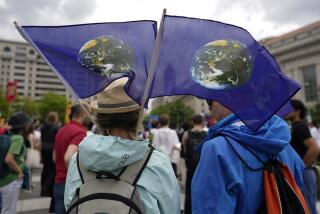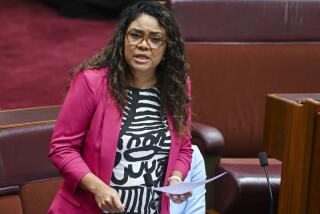Late-Blooming Greenies Show Clout in Australia
HOBART, Australia — The environmental movement arrived in Australia relatively late, but now that it has made its appearance it has done so with a vengeance. I believe it is no accident that the Labor Party, which has courted the environmental vote at the same time that the Liberal (conservative) Party has alienated it, has had its greatest success during the 1980s, when the Greenies have become politically active. In Saturday’s election we targeted 12 swing seats and won 11 of them. It was a significant number in a contest in which Prime Minister Bob Hawke will have a margin of approximately 24 seats to become the first Australian Labor Party leader to govern during three terms in succession.
The result is even more impressive when one considers that the election took place in an economy of high inflation, unemployment and climbing home-mortgage rates. Liberal Party leader John Howard offered voters hip-pocket bait--a program of tax cuts that had worked for his party in 1977 and 1980. To balance the cuts, Howard proposed reductions in public spending that would have included elimination of the federal environmental protection department, leaving Australia as the only Western democracy without such an agency.
Along with this came plans for wide-open economic development in the continent’s remaining pristine wilderness areas, among them five included on UNESCO’s 200 “world heritage” list. Tasmania’s primeval forests were to see unrestricted logging. The wetlands of Kakadu National Park, the setting of “Crocodile Dundee,” were to have been pockmarked with uranium, gold and platinum mines. The Great Barrier Reef was to be opened for possible oil exploration. The Franklin River, Australia’s last wild river and the focus of the largest-ever citizen protest here a few years ago, was again threatened with a hydroelectric project.
We had learned our lesson during the early 1970s, when Tasmania lost the incomparable white quartzite beach of Lake Tedder--the only one of its kind in the world--to the dammed waters of an unneeded hydroelectric project. Lake Tedder was deep in the heart of the southwest Tasmanian wilderness area, one of only three such remaining in all the world’s temperate zones, and the dam destroyed that heart.
When, two years later, in 1976, the Tasmanian state administration announced plans to dam the Franklin River, the Tasmanian Wilderness Society was hastily organized. During the next seven years the society grew into a national organization battling the country’s 17 largest corporations, both of the state’s political parties, and the unions. When the government refused to hold a national referendum on the Franklin River project, instead offering voters only a choice between a “big dam” and a “little dam,” the ensuing Wilderness Society campaign resulted in 48% of voters writing in “No dam” on the ballot. In 1983 the incoming Labor government canceled the project after concrete had already started to be poured.
For much of their history, Australians have felt that their environment is inferior, and have had a nostalgia for the European countryside from which most of their ancestors came. But in recent times a new sense of national pride has gone hand in hand with a rising appreciation for the beauties of the land.
Six weeks ago, as the election campaign got under way, the gains made by the Wilderness Society were jeopardized once more. Voting is mandatory in Australia, but politics is looked on by many as an evil to be tolerated rather than as a democratic process, and we discovered that voters had no clear conception of the divergent positions on the environment held by the political parties. People did not believe the political sloganeering. Market research that we conducted found that traditional techniques of newspaper appeals, street marches and “letter-boxing” of leaflets were unlikely to be enough. Only an extensive television campaign, far beyond anything that we had ever conducted and beyond our financial means, would get the message across.
What to do? Thousands of volunteers were mobilized. Money began to flow in as the consequences of failure became clearer. We approached one of the nation’s leading advertising agencies--Chandler, Hambleton--which agreed to handle the campaign free of charge, asking only seven Wilderness Society T-shirts for the people working on the ads. They prepared a spot, “The forests can’t vote but you can,” that was deemed by Australian advertising-agency executives as the single most effective message of the campaign.
The effect of our victory has been enormous. We have gained new confidence at the same time that our effectiveness is being recognized. The prime minister congratulated us and acknowledged the important role that we played in his victory. We have become a permanent power in our country, a true manifestation of a grass-roots movement that has demonstrated that an appreciation of our natural heritage can triumph over an appeal to greed.
More to Read
Sign up for Essential California
The most important California stories and recommendations in your inbox every morning.
You may occasionally receive promotional content from the Los Angeles Times.










